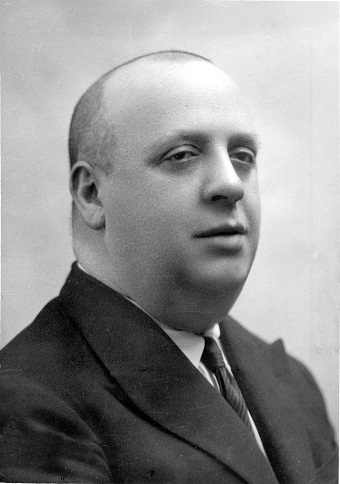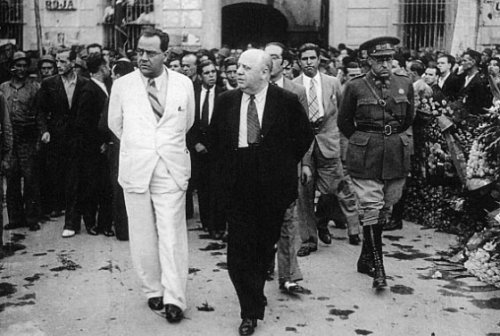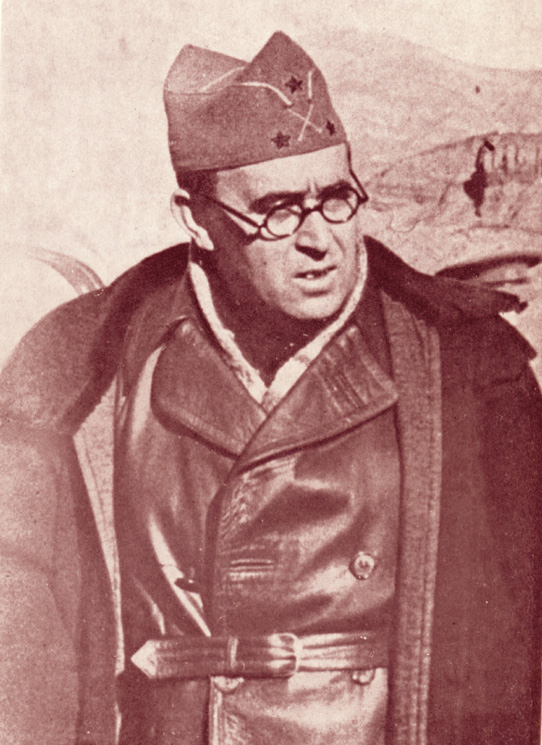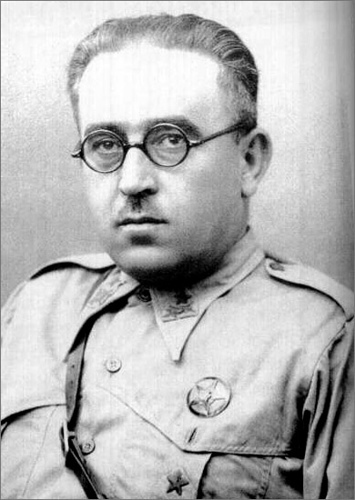<Back to Index>
- Leader of the Spanish Socialist Workers' Party Indalecio Prieto Tuero, 1883
- Chief of the General Staff of the Spanish Army Vicente Rojo Lluch, 1894
PAGE SPONSOR


Indalecio Prieto Tuero (April 30, 1883 – February 11, 1962) was a Spanish politician, one of the leading figures of the Spanish Socialist Workers' Party (PSOE) in the years before and during the Second Spanish Republic.
Born in Oviedo in 1883, his father died when he was six years old; his mother moved him to Bilbao in 1891. From a young age, he survived by selling magazines in the street; he eventually obtained work as a stenographer at the daily newspaper La Voz de Vizcaya. This led to a position as a copy editor and later a journalist at rival daily El Liberal; his career there eventually made him the director and proprietor.
In 1899 he joined the PSOE. As a journalist in the first decade of the 20th century, Prieto became a leading figure of socialism in the Basque Country.
Spain's neutrality in World War I greatly benefited Spanish industry and commerce, but those benefits were not reflected in the workers' salaries. This led to a great deal of social unrest, culminating on August 13, 1917 in a revolutionary general strike. Fear of a repetition of the then recent February Revolution in Russia (the October Revolution was still to come), the general strike was harshly put down by the military, and the members of the strike committee were arrested in Madrid. Having been involved in the organization of the strike, Prieto fled to France before he could be arrested; he did not return until April 1918, by which time he had been elected to the Spanish Congress of Deputies.
Very critical of the actions of the government and army during the Rif War or "War of Melilla" (1919 – 1926) he spoke out strongly in the Congress after the Battle of Annual (1921), as well as on the more than probable, though unproven, responsibility of the king in the imprudent military actions of general Fernández Silvestre in the Melilla command zone.
Opposed to Francisco Largo Caballero's line of partial collaboration with the dictatorship of Miguel Primo de Rivera, he had bitter confrontations with both of them.
In August 1930 he participated on his own behalf, despite the opposition of Julián Besteiro, in the Pact of San Sebastián, which included a broad coalition of republican parties that wished to do away with the Spanish monarchy. In
this matter he had the support of Largo's wing of the party, who
believed that the fall of the monarchy was necessary in order that
socialism could come to power.
When the Second Spanish Republic was proclaimed on April 14, 1931, he was named Finance Minister in the provisional government presided over by Niceto Alcalá - Zamora.
As Minister of Public Works in the 1931 - 1933 government of Manuel Azaña, he continued and expanded the policy of hydroelectric projects begun during the Primo de Rivera dictatorship, as well as the ambitious plan of infrastructural improvements in Madrid, such as the new Chamartín railway station and the tunnel under Madrid linking it to Atocha Station; most of these works that would not be completed until after the 1936 - 1939 Spanish Civil War.
Unlike Largo, he opposed the general strike and the failed armed rising of October 1934; nonetheless he again fled to France to escape possible prosecution. While, prior to the period of the Republic, Prieto had arguably maintained a "harder" line than Largo, from this time forward he would be identified as a relative moderate, opposed to Largo's more revolutionary tendency.
At the beginning of the Civil War in September 1936, after the fall of Talavera de la Reina, in Toledo province, Largo became head of the government and Prieto became Minister of Marine and Air.
After the May 3 – 8, 1937 events in Barcelona when the Communists and government forces tried to establish control over the Workers' Party of Marxist Unification (POUM) and the anarchist Confederación Nacional del Trabajo (CNT), the government of Largo was supplanted by that of Juan Negrín, with Prieto designated Minister of Defense, although, privately, he recognized that the war could not be won because the Republican side lacked support from the democratic powers such as France, the United Kingdom, and the United States. During his ministry maritime access for Soviet material aid remained effectively cut off by the attacks of Italian submarines and the French frontier remained closed.
After the defeat on the northern front in October 1937, he offered his resignation, which was rejected. He finally left the government after the March 1938 defeat on the Aragón front, following an escalating dispute with the Communists.
He refrained from active political life for the remainder of the war, exiling himself to Mexico. In 1945, toward the end of World War II, he was one of those who attempted to form a republican government in exile, hoping to reach an accord with the monarchist opposition to Francisco Franco, ruler of Spain since the end of the Civil War, with a view to restoring Spanish democracy. The failure of this initiative led to his definitive retirement from active politics.
In Mexico, he wrote several books, among them: Palabras al viento (Words in the Wind, 1942), Discursos en América (Discourses in America, 1944) and at the end of his life, Cartas a un escultor: pequeños detalles de grandes sucesos (Letters to a sculptor: small details of great events 1962).


Vicente Rojo Lluch (8 October 1894 – June 15, 1966) was Chief of the General Staff of the Spanish Armed Forces during the Spanish Civil War.
He was the posthumous son of a military man who fought against the Carlists and in the campaigns of Cuba during the Spanish - American War, from where he returned ill.
In 1911 Rojo entered the Infantry Academy at the Alcazar of Toledo, receiving his commission in 1914 with the rank of second lieutenant, fourth in a class of 390 cadets. After having been assigned to Barcelona he went on to the Group of Regulars from Ceuta (the Regulares were Moroccan colonial troops with Spanish officers). He was later posted back to Barcelona and to La Seu d'Urgell.
In 1922, having risen to the rank of captain, he returned to the Infantry Academy in Toledo, where he occupied diverse educational and administrative positions. He was one of the editors of the curricula on the subjects of "Tactics", "Weaponry" and "Firepower" for the new section of the Military Academy of Zaragoza. In this period at the Academy he collaborated on the foundation and direction of the Military Bibliographical Collection, along with captain Emilio Alamán.
In August 1932, he left the Academy to enter the Superior War School with
the objective to make the course of the General Staff. During his time
at the academy, a peculiar event took place in which he proposed to the
cadets a tactical assumption that consisted of passing through the river Ebro to establish a route in the Reus - Granadella, an operation very similar to one a few years later, during the civil war, he would later put into practice in the famous Battle of the Ebro in the area between Mequinenza and Amposta. He was promoted to major on February 25, 1936.
When the Civil War started (July 1936), Rojo - a devout Catholic, and linked to the conservative Unión Militar Española - stayed loyal to the Republican Government and was one of the military professionals who participated in the reorganization of the Republican forces.
In October 1936 he was promoted to lieutenant colonel and was designated head of the General Staff of the Forces of Defense commanded by General Jose Miaja, head of the Junta de Defensa de Madrid created to defend the capital at all costs after the transfer of the Republican government from Madrid to Valencia. In this capacity he prepared an effective defense plan for the city that prevented its fall. Afterwards, his fame as an organizer increased. As head of the Central Army HQ, he demonstrated outstanding performance in the planning of the main operations developed by the aforementioned Army, in the battles of Jarama, Guadalajara, Brunete and Belchite.
On March 24, 1937 he was promoted to colonel, and after the formation of the Negrín government in May, was made Head of the General Command Staff of the Armed Forces and head of the General Staff of the Ground forces. From this new position he was in charge of directing the expansion of the People's Army, and created the denominated Mobile Army, that served as the offensive advance force of the Republican Army.
On September 22, 1937 he was promoted to the rank of general. Throughout that year he planned the offensives of Huesca, Brunete, Belchite, Zaragoza and Teruel. He was awarded the highest Republican decoration, the "Placa Laureada de Madrid" on January 11, 1938 for his planning of the last operation.
The most ambitious operation he carried out throughout 1938 was the offensive of the Ebro, a
plan that grew from the previously mentioned tactical assumption
developed in the Superior War School, that gave rise to the long running
battles of the Ebro that developed from July 25 to November 16, 1938.
In these battles the Republic gambled its international prestige, its
endurance and the possibility of being able to give a favorable turn to
the course of the war.
After the fall of Catalonia, in February 1939, he moved with the government to France, where on February 12, 1939 he was promoted to the rank of Lieutenant General, the second only of the Republican army.
After a brief stay in that country, the Service of Emigration of Spanish Republicans (SERE) paid his passage to Buenos Aires. Between 1943 and 1956 he taught as a professor at the military school of Bolivia.
Rojo
has been considered one of the most prestigious military officers of
the Republic, and of the war as a whole. His figure was respected even
by his nationalist opponents. The most surprising homage is Franco's portrayal of him in the film Raza.
In February 1957 he returned to Spain, where most of his family already lived. This return was made possible through a series of negotiations which involved several Nationalist military officers in Madrid, F. José Luís Almenar Betancourt S.J., a Jesuit who was in contact him during his stay in Bolivia, and the Bishop of Cochabamba, a former military chaplain who had served under Rojo.
Although he was not bothered in the beginning by the Francoist authorities, on July 16, 1957 the Special Court for the Repression of Masonry and Communism informed him that he would be prosecuted for the crime of military rebellion, in his position as ex-commander of the Army. This was the customary charge on professional military officers who did not join the rebels in 1936. He was sentenced to 30 years, but did not served a single day as the sentence was suspended sentence, and he was soon pardoned.
Vicente Rojo died at his home in Madrid, June 15, 1966. Of the obituaries appearing in the Spanish press, only the one in El Alcázar, - mouthpiece of the Francoist ex-combatants - and the one by noted Falangist writer Rafael Garcia Serrano in the party press, amply eulogized his military achievements.
He wrote several books detailing his military experiences in the civil war, which were published in the following order: ¡Alerta a los pueblos!(1939), ¡España heroica! (1961) and Así fue la defensa de Madrid (1967).